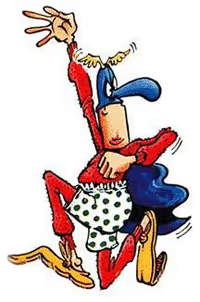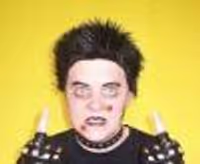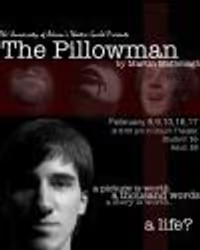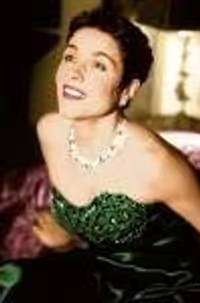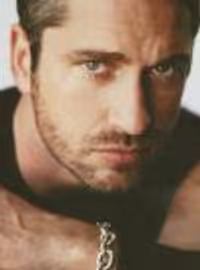Show of the Decade
#75re: Show of the Decade
Posted: 2/9/05 at 12:58pm
Munkustrap - I agree with all your choices except Music Man. Replace it with West Side Story and you'll be dead on. 2000's aren't over yet, so it's too soon to tell, but so far, I would choose Urinetown.
Margo - The funny thing is, before Mamma Mia, there was Return to the Forbidden Planet, Play On, and Buddy as jukebox musicals. You could say that Buddy (though an autobiography) really paved the way for Mamma Mia. The show ran over a decade in London and spawned successful productions in Europe as well. Though Return to the Forbidden Planet does not showcase the work of one artist, it is by far the most intelligent entry of all the jukebox shows. I saw the revival in London and wondered what happened that caused the Off-Broadway production to bomb. It was an amazing show filled with incredible talent and impeccably staged.
jim coleman
Stand-by Joined: 1/10/05
#76re: Show of the Decade
Posted: 2/9/05 at 1:13pmLots of opera companies are doing SWEENEY TODD. I, myself have conducted it at New York City Opera, Portland Opera, and most recently, Cleveland Opera. I believe that it definitely influenced the course of musical theatre as we know it today, as I also believe that OKLAhOMA and SHOW BOAT also did in their time. Whether or not you like SWEENEY, you have to realize the brilliance of it and it's construction. Sondheim is the greatest living musical dramaist today. After 600 performances of SWEENEY, I am still looking forward to the next one. Thanks for reading.
bwayballerina
Broadway Star Joined: 11/14/04
#77re: Show of the Decade
Posted: 2/9/05 at 1:28pm
Here goes...
*1940's*
Oklahoma
*1950's*
West Side Story
*1960's*
This one is tough... can it be a tie?
Cabaret
Hair
*1970's*
Another hard one, and another tie:
A Chorus Line
Sweeney Todd
(Though I understand anyone that chose The Wiz)
*1980's*
Ah, this too is hard. My favorite decade of musical theatre, I think. Also a big one with all of the British imports, so to speak. But I think it's another tie:
Les Miserables
The Phantom of the Opera
*1990's*
Rent
(Although I have to give The Lion King (and Beauty and the Beast, I suppose) some credit for getting young kids into the theatre.)
*2000's*
Hmmm... I think I'll have to go with
Urinetown
because it paved the way for Avenue Q, which is probably paving the way for other shows that aren't your "typical musical."
The One: West Side Story
For the use of choreography to advance the plot (instead of having it just to make songs interesting), being the first musical that really deviated from the typical framework of a musical and taking on an issue that was actually somewhat relevent (in a sense) at the time.
(And also because, in my opinion, the movie does the stage version justice, and vise versa... but that's just a nice bonus.)
#78re: Show of the Decade
Posted: 2/9/05 at 1:39pm
*1940's*
Oklahoma
*1950's*
West Side Story
*1960's*
Cabaret/Hair (Can't decide)
*1970's*
Sweeney Todd/A Chorus Line
*1980's*
Sunday in the Park with George
*1990's*
Rent
*2000's*
Avenue Q
One show: OKLAHOMA
Mr. TN
Stand-by Joined: 12/2/03
#79re: Show of the Decade
Posted: 2/9/05 at 2:07pm
Personally, I believe that sung through musicals are nothing special. Opera has been sung through for centuries before Webber wrote Joseph (introducing rock opera). The opera genre was already transforming itself into modern form, branching to operetta. From there, jazz, swing, big band, late romanticism, and the musical forms of the early 20th century have molded it into what we call the Americal Musical. Each time a musical form emerges, (rock in the 50s, disco in the 70s, and now rap in the 90s-00s) the musical theatre genre assimilates it. I'm sure it we are not far from rap musicals on Broadway. 8 Mile was rumored a while back and I believe it is completely relevant to progress. (And I am not a fan of rap. Personally Rachmaninoff is in my CD player right now.) Every composer, even the "great" Sondheim, takes hints from Puccini, Verdi, Bellini, Mozart, and Wagner when composing sung-through musicals. (Whether is is rock opera, operetta, or just a sung through musical a la WIW.) True musical genious is rooted in that art form. Sondheim was not the first to write complex phrasing and very scattered harmonic progression. Wagner was before him. Webber was not the first to write soaring arias and ballads. Puccini was far greater. BUT what composers have done is bring these styles to a modern audience. Using rock music, for example, appeals to the current generation. This is why teens don't always yearn for Puccini to come to town but they will certainly listen to say..We Will Rock You.
I do agree, however, that OKLAHOMA was the first successful Commercial musical which made the commercialization of the American Musical. Cohen was doing musicals long before R&H, but never on the commercial scale that is accepted now. In the early days of musical theatre (in its current form), people were not as focused on profit and recouping the investment as the are now. The unbelievable success of OKLAHOMA started the drive toward Broadway as it is now.
End of my long-winded rant.
timote316
Broadway Legend Joined: 7/20/04
#80re: Show of the Decade
Posted: 2/9/05 at 2:36pm
*1940's*
Oklahoma
*1950's*
West Side Story
*1960's*
Fiddler on the Roof
*1970's*
Sweeney Todd
*1980's*
Evita
*1990's*
Rent
*2000's*
The Producers
I decline the one show question, as I'm not familiar enough with historic shows like Sweeney or Oklahoma
#81re: Show of the Decade
Posted: 2/9/05 at 2:44pm
1940: Oklahoma
1950: Guys and Dolls
1960: Gypsy
1970: Sweeney Todd
1980: Nine
1990: Parade
2000: Avenue Q
lac77
Swing Joined: 2/8/05
#82re: Show of the Decade
Posted: 2/9/05 at 2:52pm
1940: Carousel, Oklahoma
1950: West Side Story
1960: Gypsy, Cabaret, Fiddler on the Roof
1970: A Chorus Line
1980: 42nd St., Sunday in the Park, Phantom
1990: Rent
2000: The Producers, Wicked
BSoBW2
Broadway Legend Joined: 12/8/04
#83re: Show of the Decade
Posted: 2/9/05 at 2:59pm
I never actually listed my shows, did I?
*1940's*
Oklahoma
*1950's*
West Side Story
*1960's*
(too hard!)
*1970's*
Sweeney Todd
The Wiz
*1980's*
Les Miserables
*1990's*
Rent
*2000's*
(even harder!)
And my own show is, of course, Les Mis...
#84re: Show of the Decade
Posted: 2/9/05 at 3:15pm
I, too, am confused by the number of votes for Sweeney Todd as the most influential show of the 70's. If anything, it's a throwback...although a fabulously written one. I mean...if we're saying its influence is that it made other writers want to write well, that seems a little off.
Between JCS and ACL, musicals (and the way they are made) have been altered forever.
MargoChanning
Broadway Legend Joined: 4/5/04
#85re: Show of the Decade
Posted: 2/9/05 at 3:52pm
Mister Matt,
I didn't say Mamma Mia was first (Beatlemania was a hit jukebox show 25 years ago), but it was the spark that directly led to all of the recent jukebox musicals. The other shows you named did indeed come before MM, but none of them were successful on Broadway. It was MM'S SUCCESS (and the fact that it frankly didn't take a lot of "genius" theatrical talent and know-how to create that show) that lead all of these fledgling producers to, just in the last couple of years, start running around snapping up the rights to the song catalogues of pop artists of the 60s, 70s and 80s. In the direct wake of MM's mammoth world-wide success, I don't that there is an artist with a few hit songs in the past 40 years who hasn't been approached to have their catalogue turned into a musical. It's the reason Twyla Tharp did Movin Out and is now working on a Bob Dylan musical. Heck, it's the only reason they're retrofitting the old tired 60's girl group revue "Beehive" with some lame "book" and Debbie Allen's bringing it to Broadway this summer as "Girl Group Time Travelers" (huh?) -- that is DIRECTLY the result of MM's success. It wasn't first and isn't good, but it is incredibly influential.
In terms of more positive influence, it certainly could be said the success of The Producers has led the powers that be to rediscover good old-fashioned musical comedy. The Producer's success demonstrated that we, the audience, wanted those again (especially, I guess, if they're based on movies) and so we're seeing Dirty Rotten Scoundrels and Spamalot on Broadway now (Eric Idle has actually said that he had long wanted to turn "Holy Grail" into a musical, but it wasn't until the incredible success of The Producers, that he began to work on it in earnest), with musical versions of Young Frankenstein, Being There, Legally Blonde, The Opposite of Sex and The Wedding Singer on the horizon.
#86re: Show of the Decade
Posted: 2/9/05 at 6:31pm
I was thinking....
Would it be fair to say that Tommy started/influnced the sudden flow of musical adaptaions of already existing movies? I can't think of very many movies that were turned into stage musicals before Tommy. Or if there were, this style seemed to really pick up in the mid 1990's after Tommy came out.
Margo, have any input?
Updated On: 2/9/05 at 06:31 PM
cathyhyatt
Broadway Star Joined: 10/20/04
#87re: Show of the Decade
Posted: 2/9/05 at 6:42pm
1940's*
Oklahoma
*1950's*
West Side Story
*1960's*
The Sound of Music
*1970's*
Jesus Christ Superstar
*1980's*
Les Miserables
The Phantom of the Opera
*1990's*
Ragtime
*2000's*
The Producers
Urinetown
Wicked
______________
#88re: Show of the Decade
Posted: 2/9/05 at 6:52pm
1940's: Brigadoon's the only one I've seen so...yeah
1950's: DEFINITLEY WSS
1960's: The Sound Of Music
1970's: Pippin, A Chorus Line
1980's: The Phantom Of The Opera!
1990's: Rent!
2000's: Hairspray, just...amazing
#89re: Show of the Decade
Posted: 2/9/05 at 7:36pm
40's- oklahoma!
50's- west side story
60's- cabaret and Hair
70's- a chorus line
80's- Phantom and Les miz
90's- Rent
00's - i guess i would have to say Hairspray. I have no clue though!!
#90re: Show of the Decade
Posted: 2/9/05 at 7:41pm
1940s: Finian's Rainbow
1950s: West Side Story
1960s: Cabaret
1970s: Sweeney Todd
1980s: Sunday in the Park with George
1990s: Passion, Side Show, The Life
2000s: Caroline, or Change, Amour
#91re: Show of the Decade
Posted: 2/10/05 at 2:20ammef: Did you read my initial post? It wasn't your favorite show, but the most influential. I don't see AMOUR as being incredibly influential..
MargoChanning
Broadway Legend Joined: 4/5/04
#92re: Show of the Decade
Posted: 2/10/05 at 3:38am
Just had a couple of other thoughts in terms of INFLUENTIAL shows:
-- ALLEGRO (40s) -- Rodgers & Hammerstein's failed, but very influential experimental musical from 1947. While it wasn't a total flop (315 performances in those days meant it made back its investment), it was seen as a set-back for R&H after their massive successes with Oklahoma and Carousel. That the two most powerful and respected men on Broadway took a chance on creating a wholly original show that took bold, innovative chances in terms of composition, story-telling, and form (it was the first moderately successful "concept" show) was a revolutionary act for its time.
While the show didn't ultimately "work," it must be seen as INFLUENTIAL for one major reason -- a very young Stephen Sondheim was the go-fer on the production. He spent every day of the rehearsal period and out-of-town tryout observing the process of R&H and Agnes De Mille trying, ultimately in vain, to fix this groundbreaking, challenging, genre-bending show that was totally unlike any show that had ever been written for the musical theatre up to that point. It has been suggested more than once to Sondheim that his entire career has been about "trying to fix Allegro" and he's never really denied it.
Without his experience on "Allegro," it's an open question whether Sondheim (and others) would have had the courage in his own later career as a composer to push the existing boundaries of the artform and explore subject matter and ideas musically that no one ever did before, and as a result, change the musical theatre forever.
-- SHUFFLE ALONG (1921) and THE BLACKBIRDS OF 1928
The first two majorly successful (they ran over 1000 performances combined) Broadway shows to feature and showcase the talents of African-Americans. They were the hottest tickets on Broadway in their time and white audiences flocked to see such brilliant performers as Eubie Blake, Nobel Sissle, Adelaide Hall, Tim Moore, Mantan Mooreland and Bill "Bojangles" Robinson. Their success led to the further acceptance of non-white actors on Broadway (and helped to spawn several major careers) and played a part in making the later notable shows such as of Porgy and Bess, Carmen Jones, St.Louis Woman, Anna Lucasta, Flower Drum Song, Jamaica, House of Flowers, Purlie, Raisin, The Wiz, Dreamgirls, et al possible.
#93re: Show of the Decade
Posted: 2/10/05 at 6:24amMunk, I added those shows from 2000 on because I didn't really see any that I thought were very influencial. Updated On: 2/10/05 at 06:24 AM
#94re: Show of the Decade
Posted: 2/10/05 at 11:12am
Margo - Actually, I knew what you meant about Mamma Mia being influential in the here and now, but I thought it was interesting that the jukebox musical has actually been around a while and yet Mamma Mia was the one that sparked the new trend after superior ones had already existed. I think probably most of its credit would be given to the universal popularity of ABBA over the last 30 years and that their songs lend themselves more easily to a book musical than perhaps, The Beatles. I don't know much about Beatlemania, but I thought it was more of a cover band review rather than a book show. I think I have the LP and will do some reading up on the show.
I love how you use "old-fashioned musical comedy" and The Opposite of Sex in the same paragraph. Just the thought of the homogenization of the two makes me shudder, but who knows? Maybe it will be great. Or maybe it will be like the film.
I also liked your comments about Shuffle Along and Allegro. I once asked Stuart Ostrow about seeing Allegro because I had always been very intrigued by the show. He loved it and said it was way ahead of its time. He believed audiences and critics simply weren't ready for it. Personally, I would love to see Sondheim actually fix Allegro in his lifetime quite literally. I know he only works on new material, but I think if anyone could do it, he could, and it would be worth the effort.
#95re: Show of the Decade
Posted: 2/10/05 at 7:38pm
40s: Oklahoma!
50s: West Side Story
60s: Cabaret
70s: The Wiz
80s: Les Miserables
90s: Rent
00s: Urinetown
All-time-Oklahoma! with WSS in a close second.
Okay, another sidenote, I'll finally ask. I saw Sweeney Todd on video, after it taking awhile to get myself to want to watch it because of some of the plot and scenes and well...you know. I enjoyed it more than I thought I would, and you know it was entertaining, but I never considered it one of my favorite musicals and since I've been a member I've seen that almost everyone who is a huge Broadway fanatic loves Sweeney Todd and admires it so much and it's great, I just feel like I'm missing something. So..I don't know if it's appropriate to do in this thread, but you could start another thread or PM me or something...can someone or a couple of you try to explain to me what is so captivating and great and amazing about it? I don't mean this to say it's ehh, I've just decided I'm really missing something and I'm curious about its greatness and maybe once I learn more about it I can watch it again and appreciate it the way lots of you do.
Dare2DefyGravity
Chorus Member Joined: 12/19/04
#96re: Show of the Decade
Posted: 2/10/05 at 10:10pm
1940s: Oklahoma!
1950s: West Side Story
1960s: Cabaret
1970s: A Chorus Line
Chicago
Sweeney Todd
1980s: Evita
The Phantom of the Opera
Cats (not my personal choice, but it did open doors)
Les Miserables
1990s: Rent
The Lion King
2000s: Mamma Mia!
Wicked
ONE SHOW: Rent
Derek
Broadway Star Joined: 9/14/03
#97re: Show of the Decade
Posted: 2/10/05 at 10:41pmI think there has been such a variety of shows produced in the new millenium. Avenue Q (puppets singing), The Producers (typical musical comedy...winner of the most tony awards), Wicked (BIG broadway musical/special effects (Dragon, Projections, flying, bubble, wizards head, flying monkeys), New Jukebox musicals....there has just been so many different kinds
MargoChanning
Broadway Legend Joined: 4/5/04
#98re: Show of the Decade
Posted: 2/11/05 at 1:55am
Mister Matt,
I too would love to see Sondheim roll up his sleeves and fix ALLEGRO -- and here's no doubt in my mind that Ted Chapin and the R&H Foundation would give him total carte blanche to rewrite it as he saw fit.
Sondheim would need help though. From what I understand, the problems with ALLEGRO aren't so much about the score (which Sondheim could certainly tinker with) as much as the book and the staging. He's need a first-rate book writer who's a master of structure with him to doctor the original and I'm not sure who that would be (Weidman? Meehan? Kushner?). It would also be good to have the old team of Prince, Tunick and Gemignani on board as well. Not sure how much interest any of them have in such a project, but it's fun to dream.
SeptemberKel
Featured Actor Joined: 8/20/04
#99re: Show of the Decade
Posted: 2/11/05 at 8:56am
1940's: Oklahoma
1950's: West Side Story
1960's: Cabaret
1970's: Sweeney Todd
1980's: Les Miserables
1990's: Rent
2000's: Avenue Q
One Show: West Side Story
Videos


